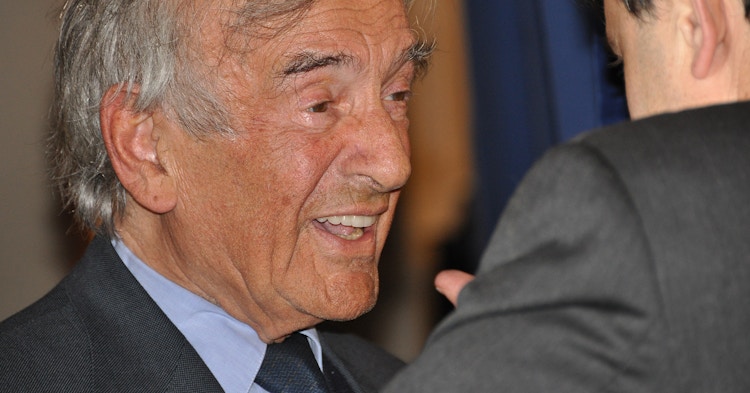− Felt we were part of something huge
In 1990, Nobel laureate Elie Wiesel (1928-2016) spearheaded the conference "The Anatomy of Hate" in Oslo, and brought celebrities and political leaders together in Oslo Concert Hall for a special concert.
Written by Fred-Olav Vatne

Elie Wiesel (1928−2016) was awarded the Nobel Peace Prize in 1986.
© Veni Markovski (flickr.com/veni
The author, professor and activist Elie Wiesel died on 2nd July, 87 years old. He wrote numerous books, some of them about his experiences from concentration camps during World War II, and received the Nobel Peace Prize in 1986 for his work for human rights.
A few years after receiving the Peace Prize, he took the initiative to host a conference in Oslo. The conference was to include a gala concert in collaboration with the Oslo Philharmonic. The result, the concert "Hatets anatomi", took place in August 1990 and can now be viewed on the web site of Norwegian Broadcasting Corporation (NRK).
View concert: Hatets anatomi − Concert
The event was not only a great concert, it was a large-scale exhibition of world stars: screen stars Gregory Peck and Audrey Hepburn presented the concert, flautist James Galway and soprano Frederica von Stade were among the soloists, and the list of speakers included amongst others the Czech President Václav Havel and Elie Wiesel himself.
− We had tremendous respect for him
"We've probably never experienced such a collection of famous personalities from home and abroad on Norwegian soil," said NRK's Bjørn Hansen as he presented the TV transmission of the concert.
− He had many contacts in Norway, had heard us in concert before and knew Oslo Philharmonic as a good orchestra, says Trond Okkelmo, who was CEO of the Oslo Philharmonic at the time Wiesel took the initiative.
− Elie Wiesel's name and reputation made it easy for him, in collaboration with pianist Caroline Stoessinger, to compile the program and to recruit stars for this special concert. Some of the internationally renowned soloists, like Frederica von Stade and James Galway, had visited Oslo Philharmonic before, and Simon Estes was already engaged to Verdi's Requiem the same season.
Okkelmo has only good memories from the collaboration with Wiesel:
− He was a very pleasant man, and working with him was like a dream. We obviously had a tremendous respect for him, and when he walked into a room, he owned it immediately.
− Everything was quiet, calm and professional
With prominent politicians like Václav Havel and French president François Mitterrand in the audience, a lot more than music had to be prepared:
− The security measures were strict, for instance, security guards were present during the reception held in the "Small Hall". Václav not only spoke, he had brought with him an outstanding girls' choir from his homeland. And the leader of the student demonstration on Tiananmen Square in Beijing stirred the audience at the concert with his speech.
The event ran smoothly:
− Everyone knew what to do, it was typical Oslo Philharmonic; everything was quiet, calm and professional and no one made any fuss of all the celebrities. But it was fun having them here, of course! A gripping moment for me was when Gregory Peck recited Lincoln's Gettysburg speech, to the music of Aaron Copland. When I see this concert now, it strikes me that its message unfortunately is as relevant now as then, concludes Mr. Okkelmo.